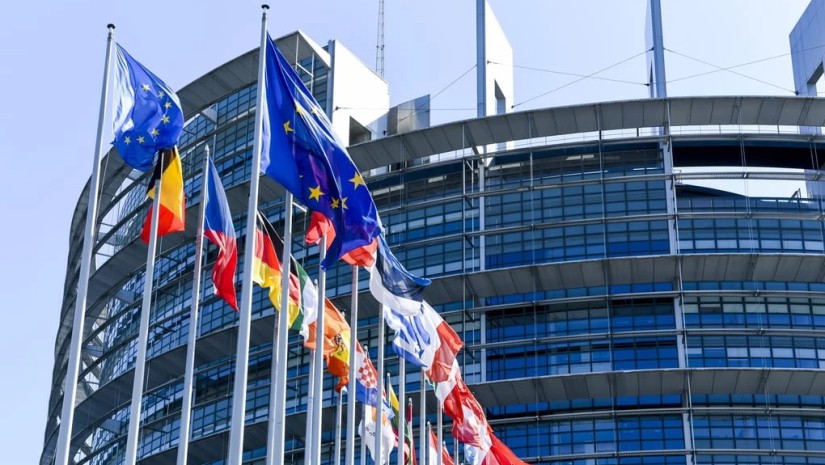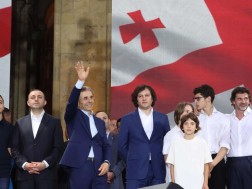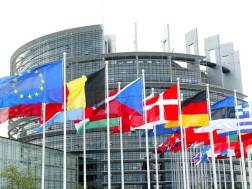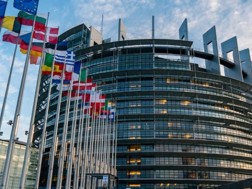Fourteen members of the European Parliament drafted a resolution on the democratic backsliding and threats to political pluralism in Georgia.
The authors of the draft resolution are Urmas Paet, Petras Auštrevičius, Dan Barna, Helmut Brandstätter, Benoit Cassart, Olivier Chastel, Veronika Cifrová Ostrihoňová, Bernard Guetta, Ľubica Karvašová, Ilhan Kyuchyuk, Marie‑Agnes Strack‑Zimmermann, Hilde Vautmans, Lucia Yar, Dainius Žalimas
on behalf of the Renew Group.
Here is the draft resolution in full:
— having regard to its previous resolutions on Georgia,
– having regard to the Association Agreement between the European Union and the European Atomic Energy Community and their Member States, of the one part, and Georgia, of the other part[1],
– having regard to the European Council conclusions of 14 and 15 December 2023 and to the Commission communication of 8 November 2023 entitled ‘2023 Communication on EU Enlargement Policy’ (COM(2023)0690), which outline the steps for Georgia’s candidacy status, particularly step 9, concerning the freedom of civil society,
– having regard to the statement by the spokesperson for the European External Action Service of 4 September 2024 on the legislative package on ‘family values and protection of minors’ in Georgia,
– having regard to the statement of 18 September 2024 by the Vice-President of the Commission / High Representative of the Union for Foreign Affairs and Security Policy on the laws, adopted by the Georgian Parliament, on ‘family values and protection of minors’,
– having regard to the opinions adopted or endorsed by the European Commission for Democracy through Law (Venice Commission) on various pieces of Georgian legislation at its 139th session (21-22 June 2024),
– having regard to Rule 136(2) of its Rules of Procedure,
A. whereas the Constitution of Georgia protects the exercise of the freedoms of opinion, expression, association and peaceful assembly, and the right to universal, equal and free elections, as fundamental rights; whereas the Constitution of Georgia also guarantees the equality of all persons and protects them from discrimination; whereas, according to Article 78 of the Constitution of Georgia, ‘the constitutional bodies shall take all measures within the scope of their competences to ensure the full integration of Georgia into the European Union and the North Atlantic Treaty Organization’;
B. whereas, despite widespread public protests and calls from the EU and Georgia’s other Western partners, the ruling Georgian Dream party has adopted a Russian-inspired bill on the ‘transparency of foreign influence’, which requires civil society and media organisations that accept funds from abroad to register as ‘organisations pursuing the interest of a foreign power’ or face fines;
C. whereas this legislation limits the capacity of civil society and media organisations to operate freely, curtails freedom of expression and unfairly stigmatises organisations that deliver clear benefits to the citizens of Georgia;
D. whereas in March 2023, a proposal for similar legislation sparked widespread protests in Georgia, leading to its withdrawal; whereas since the proposal’s withdrawal in 2023, the ruling party and pro-government media have continued to escalate rhetoric against civil society and journalists;
E. whereas on 20 February 2024, the ruling Georgian Dream party adopted amendments to the electoral legislation, endangering the independence and impartiality of the Central Election Commission and undermining public trust in this institution;
F. whereas in late August 2024, oligarch Bidzina Ivanishvili urged voters to help the Georgian Dream party retain a supermajority in the Georgian Parliament in order to initiate the process of outlawing several opposition parties; whereas this was supported by Georgia’s Prime Minister Irakli Kobakhidze, who announced that the government would seek to ban more than half a dozen parties following the parliamentary elections;
G. whereas on 17 September 2024, the ruling Georgian Dream party passed a law on ‘family values and protection of minors’, which strips LGBTIQ+ people of their rights;
H. whereas two days after the introduction of the law on ‘family values and protection of minors’, Kesaria Abramidze, a transgender model and prominent public figure, was killed in her apartment;
I. whereas previously, on 4 April 2024, the ruling Georgian Dream party abolished the mandatory gender quotas for political parties’ electoral lists contained in Georgia’s election code and overturned the gender-related funding rule laid down in the law on political associations of citizens, thereby undoing the progress achieved on the promotion of women’s political participation and representation;
J. whereas the Georgian authorities have not acted on a single recommendation of the Venice Commission regarding the annulment or modification of the above-mentioned legislation on the ‘transparency of foreign influence’ and on ‘family values and protection of minors’, the abolition of gender quotas in local and parliamentary elections, and the formation of the Central Election Commission;
K. whereas the ruling Georgian Dream party and pro-government media are spreading anti-EU and anti-democratic propaganda, as well as conspiracy theories;
L. whereas the ruling Georgian Dream party and its leadership continue to escalate divisive, distorted and violent rhetoric against political opponents and international partners, including Ukraine; whereas the ruling party uses despicable political banners depicting Ukrainian cities destroyed by Russia, thus capitalising on the suffering of brave Ukrainians;
M. whereas Russian Foreign Minister Sergei Lavrov’s statement expressing his readiness to help Georgia normalise its relations with ‘the neighbouring … states of Abkhazia and South Ossetia’ was praised by the leaders of the ruling party, demonstrating the Georgian Government’s departure from its policy of non-recognition of the occupied regions of Georgia;
N. whereas in the Commission communication entitled ‘2023 Communication on EU Enlargement Policy’, the Commission recommended granting candidate status to Georgia on the understanding that Georgia takes nine steps, which include combating disinformation and interference against the EU and its values, engaging opposition parties and civil society in governance, and ensuring freedom of assembly and expression, as well as consulting civil society and involving it meaningfully in legislative and policymaking processes and ensuring that civil society can operate freely;
O. whereas on 14 December 2023, Georgia was granted EU candidate status by the European Council on the understanding that the nine steps set out in the Commission recommendation are taken;
P. whereas Georgia’s Prime Minister Irakli Kobakhidze has stated that Georgia will not impose sanctions on Russia, but only prevent their circumvention from happening on its territory;
Q. whereas trade and business cooperation between Georgia and Russia has increased over the past two years, with more than 100 000 Russians having moved to Georgia, opened more than 26 000 businesses, purchased real estate and engaged in activities that create risks of money laundering; whereas this situation jeopardises Georgia’s national security and increases its dependence on Russia;
R. whereas in recent months, the United States has imposed financial sanctions on Georgian security officials and the leaders of a far-right party for undermining and suppressing the freedom of peaceful assembly in Georgia, and has imposed travel sanctions on 60 other individuals, including senior government officials; whereas the National Bank of Georgia has refused to comply with these sanctions;
S. whereas parliamentary elections are scheduled to be held in Georgia on 26 October 2024;
1. Strongly condemns the adoption of the so-called ‘transparency of foreign influence’ and ‘family values and protection of minors’ legislation, as well as the abolition of gender quotas in local and parliamentary elections and the changes in formation of the Central Election Commission by the Georgian Dream majority; underlines that this legislation is incompatible with EU norms and values, damages Georgia’s reputation and jeopardises its efforts towards EU accession;
2. Urges the Georgian Dream majority to immediately withdraw the legislation on the ‘transparency of foreign influence’ and ‘family values and protection of minors’, to reintroduce gender quotas in local and parliamentary elections, and to ensure a consensus-based political process, which is crucial for the independence and impartiality of the Central Election Commission and for public trust in that institution; urges the Georgian Dream majority to implement the other recommendations of the Venice Commission; reiterates its call to cease all attacks on civil society, independent media, gender equality and the LGBTIQ+ community and to ensure a genuine enabling environment for civil society and media in the country;
3. Stresses that the withdrawal of the legislation on the ‘transparency of foreign influence’ and ‘family values and protection of minors’ will be necessary steps in improving the relationship between the EU and Georgia;
4. Stands in solidarity with the courageous Georgian people fighting for their democratic rights and the European future of their country; reiterates its unwavering support for all those who advocate for and defend human rights and work for a peaceful country and society committed to equality and human dignity for all;
5. Calls for the EU funding provided to the Georgian Government to be frozen until these illiberal pieces of legislation are repealed, and for strict conditions to be placed on the disbursement of any future funding to the Georgian Government;
6. Reiterates its calls on the Commission to promptly assess how Georgia’s legislation on the ‘transparency of foreign influence’ and ‘family values and protection of minors’, as well as the abolition of gender quotas and other changes in its electoral legislation, and the implementation of the Venice Commission’s recommendations in general, affect Georgia’s continuous fulfilment of the visa liberalisation benchmarks, in particular the fundamental rights benchmark, which is a crucial component of the EU visa liberalisation policy;
7. Calls for the EU and its Member States to impose sanctions on Georgian officials who are involved in human rights violations against Georgian citizens or in the country’s democratic backsliding; reiterates its call on the Council to consider imposing personal sanctions on Bidzina Ivanishvili for his role in the deterioration of the political process and the human rights situation in Georgia; urges Georgian commercial banks to implement international sanctions;
8. Reminds the Georgian Government that the EU granted Georgia candidate status on the understanding that the steps set out in the Commission communication of 8 November 2023 would be taken; underscores that the recently adopted pieces of legislation clearly go against this goal and put Georgia’s EU integration on hold;
9. Reiterates its call on the Georgian Government to uphold its commitment to the promotion of democracy, the rule of law and human rights, and encourages it to adopt and implement reforms that are in line with its stated objective of joining the EU, as demanded by a large majority of Georgia’s citizens;
10. Strongly urges Georgia, as an EU candidate country, to impose sanctions on Russia in response to Russia’s full-scale invasion of Ukraine and to effectively enforce measures to prevent the circumvention of EU sanctions, as it has committed to doing; is deeply concerned by the alignment of the Georgian Government with Russian policies and the increasing dependence of Georgia on Russia, and by the Georgian Dream party’s use of violent images of the war in Ukraine as a means of manipulating public opinion and spreading disinformation in its campaign ahead of the October 2024 elections; calls on Georgia to fully align with the EU’s foreign policy and the EU’s strategy towards Russia;
11. Calls for the EU and its Member States to guarantee their full support to Georgian civil society organisations in this difficult period, including on issues linked to fines and other burdens imposed on them by the new legislation;
12. Urges the Georgian authorities to ensure that the October 2024 parliamentary elections adhere to the highest international standards, guaranteeing a transparent, free and fair process that reflects the democratic will of the people; urges the abolition of the ingrained practice of misusing public resources and administrative capacity for the benefit of the ruling party; insists that the presence of both domestic and international observers should be ensured in order to safeguard the integrity of the elections and calls for an expanded EU election observation mission;
13. Is deeply concerned by reports that the Georgian Government is creating obstacles for the coalition of 30 NGOs and Transparency International Georgia in their efforts to conduct the ‘Go Out and Vote’ campaign; considers these obstacles an attempt to undermine democracy in the country;
14. Is extremely concerned about the police brutality that occurred during the protests of March-June 2024 in Tbilisi, and calls on the Georgian authorities to conduct timely and thorough investigations into that police brutality;
15. Reiterates its call for an impartial and independent long-term international election observation mission by the Organization for Security and Co-operation in Europe’s Office for Democratic Institutions and Human Rights, in order to monitor Georgia’s upcoming parliamentary elections;
16. Reiterates its call on the Georgian authorities to immediately release former President Mikheil Saakashvili and to allow him to receive proper medical treatment abroad;
17. Calls for the EU and its Member States to continue to pay close attention to these matters and to closely monitor developments in Georgia ahead of and after the country’s October 2024 parliamentary elections;
18. Instructs its President to forward this resolution to the Vice-President of the Commission / High Representative of the Union for Foreign Affairs and Security Policy, the Council, the Commission, the governments and parliaments of the Member States, the Council of Europe, the Organization for Security and Co-operation in Europe and the President, Government and Parliament of Georgia.
















